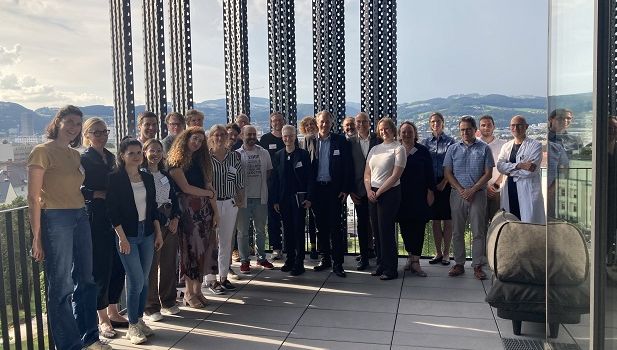The JKU Faculty of Medicine’s Clinical Research Institute (KFI) for Neurosciences hosted its inaugural Neuroscience Symposium in June.

Mag. Dr. Elgin Drda, Vice-Rector of the Faculty of Medicine at the Johannes Kepler University Linz, and Univ. Prof. Dr. Raimund Helbok, head of the Department of Neurology and assistant head of KFI Neurosciences, held opening remarks and officially welcomed the participants.
Together with international representatives from the Danish neuroscience network "BAT CAG - Neuroscience Research Network" (Rigshospitalet, University of Copenhagen; under the leadership of Assist. Prof. Dr. Martin Fabricius and Dr. Martin Ballegaard with colleagues at Zealand University Hospital Roskilde in Denmark), the symposium’s interactive scientific sessions focused on creating future inter-university collaboration projects.
Among various topics, the extensive program covered neurosurgical aspects of aneurysm surgery (Prof. Dr. Torstein R. Meling, president of the European Association of Neurosurgical Societies and Chair of the Department of Neurosurgery, Rigshospitalet, University of Copenhagen, Prof. Dr. Andreas Gruber, Chairman of the Department of Neurosurgery, JKU Linz). In addition, historical/clinical/and translational aspects of "cortical depolarization waves" were also part of the program, considered as a phenomenon not only in the pathophysiology of migraine, but also as a sign of secondary brain damage after stroke, craniocerebral trauma, or cerebral hemorrhage. The Department of Neurology, the Institute of Anatomy (Prof. Dr. Maren Engelhardt), and the Department of Neurosurgery (Prof. Dr. Andreas Gruber) are also currently conducting research into the phenomenon of "cortical depolarization waves" at the cellular level and in an interdisciplinary context. Other topics included epilepsy and seizure detection, specialized electrophysiology, and the use of big data as well as data management, particularly in the field of multimodal neuromonitoring.
The successful symposium hosted 50 participants and featured numerous interdisciplinary and cross-university discussions.
 Go to JKU Homepage
Go to JKU Homepage











